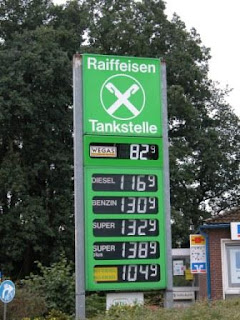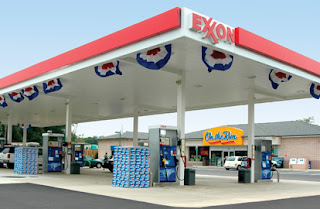Worried that we may soon have to pay $4/gal? Well, if we do end up paying that much, it seems that we would only be in the middle of the pack when we start looking at global gas prices:
Source: CNN Money
Netherlands, Amsterdam……………………… $6.48 
Norway, Oslo………………………………………… $6.27
Italy, Milan…………………………………………… $5.96
Denmark, Copenhagen…………………………. $5.93
Belgium, Brussels…………………………………. $5.91
Sweden, Stockholm………………………………. $5.80
United, Kingdom London………………………. $5.79
Germany, Frankfurt……………………………… $5.57
France, Paris………………………………………… $5.54
Portugal, Lisbon……………………………………. $5.35
Hungary, Budapest………………………………. $4.94
Luxembourg…………………………………………. $4.82
Croatia, Zagreb…………………………………….. $4.81
Ireland, Dublin…………………………………….. $4.78
Switzerland, Geneva……………………………. $4.74
Spain, Madrid………………………………………. $4.55
Japan, Tokyo………………………………………. $4.24
Czech Republic, Prague……………………….. $4.19
Romania, Bucharest……………………………. $4.09
Andorra………………………………………………. $4.08
Estonia, Tallinn……………………………………. $3.62
Bulgaria, Sofia……………………………………… $3.52
Brazil, Brasilia……………………………………… $3.12
Cuba, Havana……………………………………… $3.03
Taiwan, Taipei…………………………………….. $2.84
Lebanon, Beirut…………………………………… $2.63
South Africa, Johannesburg…………………. $2.62
Nicaragua, Managua…………………………….. $2.61
Panama, Panama City………………………….. $2.19
Russia, Moscow……………………………………. $2.10
Puerto Rico, San Juan………………………….. $1.74
Saudi Arabia, Riyadh…………………………… $0.91
Kuwait, Kuwait City…………………………….. $0.78
Egypt, Cairo………………………………………… $0.65
Nigeria, Lagos……………………………………… $0.38
Venezuela, Caracas……………………………… $0.12
Boycotting gas stations is like attempting to boycott electricity
I received an e-mail yesterday from a friend of mine that showed “how we can get gas down back to $1.30.” The solution, according to the e-mail is “for the rest of this year, DON’T purchase ANY gasoline fromthe two biggest companies (which now are one), EXXON and MOBIL.If they are not selling any gas, they will be inclined to reduce their prices.”
First of all, let us understand that big oil companies such as ExxonMobil, Valero, ConocoPhillips, ChevronTexaco, and others are having record profits right now because of margins. If you talk to a refinery manager that is all you will hear about: margins. What is a refining margin? It is the difference between the wholesale price of gasoline and the market price of crude oil. Simple arithmetic tells us that if the price of crude oil is too high and the sale price of gas is not high enough, the margins can either be very low or negative. This is what happened in the 1980s to the refining business. Back then, refining companies had to recur to massive layoffs, because they were barely staying in business.
You also need to keep in mind that big oil companies are faced with many challenges that are primarily dictated by environmental regulations. In the past 5 years or so, refining companies have had to spend billions and billions of dollars to implement processes that reduce the sulfur in gasoline and diesel. This, in turn, reduces the amount of SO2 and SO3 released to the atmosphere everytime we drive our vehicles. When I worked in ConocoPhillips, I could see how the Research and Development department was also spending billions and billions of dollars in researching new processes for alternative fuels. These companies are not naive and understand the challenges that we have ahead of us: a potential regulation on fossil fuel production and consumption that would force a migration to alternative fuels due to concerns with global warming. Even though many people are uncomfortable with such high profits that these corporations are making, I can attest to the fact that this money is invested in further research and development (ok… probably after the big dogs get all their bonuses) and that there is no better time to do this than now.
And if you think you are hurting ExxonMobil when you don’t buy gas at their stations… well, you are not and you won’t. Here are my two cents from my post on Citgo, but also applies to ExxonMobil or any other oil company:
The truth behind boycotting CITGO
What happens when you don’t buy gas at Citgo stations?
First of all, gas stations are primarily owned by individuals and not by oil companies.  Approximately 1-4% of branded gas stations are owned by the companies themselves, if that many, but why? Revenues from these facilities are minimal for oil companies to be worrying about paying the costs to maintain them. It’s just not practical and not necessary for big companies to own these businesses when individuals can very well take care of them. However, there is some sort of royalty that individuals have to pay to the company in order to keep a specific brand at their gas stations. When you compare the revenues proceeding from owning gas stations to those that oil companies have during the good times (when the oil is at over $50/bbl, not during the 80s when oil had crashed!) owning gas stations is simply not business-smart. That being said, the revenues, or lack thereof, from gas stations do not affect greatly oil company profits.
Approximately 1-4% of branded gas stations are owned by the companies themselves, if that many, but why? Revenues from these facilities are minimal for oil companies to be worrying about paying the costs to maintain them. It’s just not practical and not necessary for big companies to own these businesses when individuals can very well take care of them. However, there is some sort of royalty that individuals have to pay to the company in order to keep a specific brand at their gas stations. When you compare the revenues proceeding from owning gas stations to those that oil companies have during the good times (when the oil is at over $50/bbl, not during the 80s when oil had crashed!) owning gas stations is simply not business-smart. That being said, the revenues, or lack thereof, from gas stations do not affect greatly oil company profits.
Are you buying CITGO gas at CITGO gas stations?
Not necessarily. In fact, you are not buying Shell gas at Shell gas stations either! How can this be? I mean by “CITGO gas” or “Shell gas” the “gas” which comes from a CITGO or Shell refinery, respectively. Yes, these huge facilities called refineries are the primary revenue for CITGO, in this case. Other integrated energy companies, such as ExxonMobil, ConocoPhillips, BP, Shell, ChevronTexaco, can get their revenues from their upstream operations (i.e. crude oil production) instead of their downstream operations (i.e. crude oil refining), but when refined product prices are adequate, refining margins can be high and hence, profits are high. Keep in mind that this is not always the case though as the oil industry in the 80s was very much struggling to make any profit due to low crude oil prices. Anyway, let’s say that you have two refineries in your area and one is CITGO and the other one is Shell. The CITGO refinery is capable of making all three grades of unleaded gasoline, whereas the Shell refinery can only make regular. To minimize transportation costs, which would ultimately translate in lower gasoline costs for you, usually the local refineries will provide gasoline and diesel to the local gas stations. Well, but you decide to boycott the CITGO station, because you read it on a blog, and go to the Exxon station to fill up your SUV with premium instead. Guess what! The gas you’re putting in your SUV is from the CITGO refinery and, therefore, CITGO is making money from it! Because remember, the hypothetical Shell refinery was not able to make premium gasoline. This scenario is actually true for the CITGO Lake Charles refinery in Louisiana. The only difference is that the Exxon gas you just purchased has additives that are specific to Exxon gas. Same goes for Chevron, Conoco, Phillips, Texaco, BP, or any other kind of branded gasoline.
This is how it works:Crude oil is processed in refineries. At the refinery terminals, there are different vessels holding the different additives for branded gasoline. So yes, the CITGO refineries are going to have all these other additives added to the gasoline produced in their refineries. Once the respective gasoline brands have their additives, they are distributed locally to their respective gas stations.

















